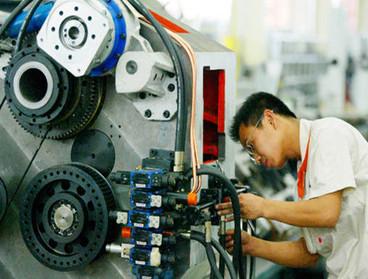 According to data from the National Bureau of Statistics, China's Manufacturing Purchasing Managers Index (PMI) was 50.2% in February, 0.3 percentage points lower than last month, still higher than the critical point, indicating that China's manufacturing industry continues to expand, but is affected by the Spring Festival. The growth rate has slowed down.
According to data from the National Bureau of Statistics, China's Manufacturing Purchasing Managers Index (PMI) was 50.2% in February, 0.3 percentage points lower than last month, still higher than the critical point, indicating that China's manufacturing industry continues to expand, but is affected by the Spring Festival. The growth rate has slowed down. Zhao Qinghe, a senior statistician at the National Bureau of Statistics Service Survey Center, said that the PMI decline was mainly affected by the Spring Festival. Spring holidays have also had some impact on China's imports and exports. Both the new export order index and the import index, which reflect the foreign trade of the manufacturing industry, both fell to 48.2% and 46.5%, respectively, and remained below the critical point. The trend in the latter period still needs further observation.
Chen Yufei, a research fellow at the Bank of Communications Research Center for Finance and Banking, said that due to the lack of start-up of businesses and the weakening of restocking intentions before and after the Spring Festival, the PMI production index and raw material inventory index both fell by 0.4 percentage points in February. Among them, the raw materials inventory index fell to a new low of 47.4 in the first half of the year, while in February, the inventory of finished goods went up by 1.3%. Looking at the experience of “divergence†of raw material inventory and finished product inventory, the passive growth of finished goods inventory may spur the willingness of raw material manufacturers to purchase, and in the short term, the company’s inventory replacement power may be weakened.
Although the PMI sub-indices generally fell, the expected index of production and operation activities climbed to 61.8%, a sharp increase of 10.5 percentage points from the previous month to a high of nearly 11 months, indicating that the company's confidence in the development of the future will increase. With the elimination of spring and holiday factors, combined with the warming of the weather and the concentration of businesses, the production and business activities of the company will become active in the future, and the manufacturing industry is expected to continue its stable operation.
According to Chen Zhongtao, an analyst at the China Logistics Information Center, the decrease in the PMI decline in the past two months also reflects the positive factors that are beginning to appear in some economic operations. From the external environment, since the third quarter of last year, the overall development of the global economy has maintained a good momentum. The global manufacturing PMI index has remained stable at a relatively high level, which is conducive to maintaining the stability of exports. In particular, the recent devaluation of the renminbi has played a positive role in reducing costs and expanding exports for SMEs.
Lu Zhengwei, chief economist of Industrial Bank, judged that if the reform of the RMB exchange rate formation mechanism is really started this year, the growth situation may eventually be better than expected, and the price index will be slightly higher than expected. In addition, the effect of “structural adjustment†in the past year has begun to appear. According to the survey, the basic raw material industry represented by iron and steel and the industry with overcapacity continued to fall; the equipment manufacturing industry with higher technological content and the computer communication and electronic equipment manufacturing industry still maintained rapid development.
Parts For Cars And Home Appliances
Parts For Cars And Home Appliances ,Shock Absorber Boot Covers,Small Steel Ball Bearings,Elevator Non-Standardized Component
Ningbo Metal Sharing Supply Chain Management Co., Ltd , https://www.metalsharing.com